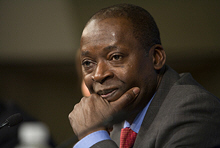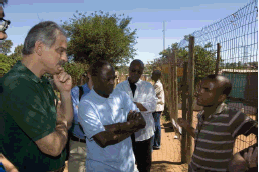
Typical street scene in Santa Ana, El Salvador. (Photo: iStock)
IMF Survey: Africa Seeing Rewards of Better Policies
March 20, 2008
- Africa overall coping well with impact of commodity boom
- But IMF should be flexible if importers need to adjust
- Africa's biggest challenge to meet Millennium Development Goals
In recent months, prices of oil, nickel, tin, corn, and wheat have hit record highs, building on dramatic increases since their lows of 2000.

Bio-Tchané: "I have seen, over and over again, that good economic policies make a real difference in how a country fares." (IMF photo)
INTERVIEW WITH ABDOULAYE BIO-TCHANE
What does this mean for sub-Saharan Africa, a highly diverse region of net commodity importers and exporters?
Abdoulaye Bio-Tchané, who recently stepped down as Director of the IMF's African Department, tells IMF Survey online that so far, unlike in past commodity booms, Africa is coping well.
But Bio-Tchané, who will shortly take over as President of the West African Development Bank, warns that Africa needs to move swiftly to sustain and broaden growth—given that few African countries look likely to meet the UN Millennium Development Goals (MDGs) on poverty and human development.
IMF Survey online: How is Africa as a whole faring with the boom in oil, metals, and food prices now affecting the global economy?
Bio-Tchané: In contrast to earlier commodity booms, this time around Africa has been coping remarkably well. Resource-rich countries have been using their windfall profits to scale up outlays on infrastructure and social services, and they've also been saving a lot more than in previous episodes, reducing the risk of a boom-bust cycle.
Abdoulaye Bio-Tchané
Abdoulaye Bio-Tchané takes up the reins as President of the West African Development Bank, based in Lomé, Togo, in early May 2008, after serving for 6 years as Director of the IMF's African Department. Before joining the IMF staff for a second time, he was Benin's Minister of Finance and Economy. Bio-Tchané began his career as an economist in the Central Bank of West African States (BCEAO), where he rose to become Director of the Economic and Monetary Survey Department.
Net commodity importers have held up quite well so far. But with the recent further increases in fuel prices and the unexpected surge in food prices, they're now facing a double blow—which could lead to higher inflation and slower growth. And given the dire social situation in some countries, the high prices are being felt more severely than in other regions.
For African policymakers, the immediate challenge will be to find an appropriate mix of financing and adjustment. [see related story "Coping with Food Price Increases"] The IMF can help by being sufficiently flexible and imaginative to help them address not only an economic but also a social situation. In the years ahead, stabilization and economic reform offer the best means of adjusting to the boom.
IMF Survey online: What can governments do about the impact of food price hikes?
Bio-Tchané: In the short run, they could alter tax policies or introduce targeted subsidies. For instance, in some countries import duties on products like rice and milk are running at 40 percent, so the tax could be lowered to 30 percent or even 20 percent. In fact, a couple of countries have done just that—and the IMF has temporarily accepted the reduction. Similarly, some countries might want to subsidize transportation in urban areas, and, here again, the IMF could be supportive.
IMF Survey online: Some countries have even banned exports of certain products to ensure sufficient domestic supplies. Should the IMF be supportive of that, too?
Bio-Tchané: Those kinds of measures should really be exceptional because supply, even in the short run, can be increased dramatically. Banning exports might sound like a good solution because it will allow the population to access needed commodities, such as corn. But in the short run, farmers are hurt. If prices are attractive, farmers will produce more. And there are many global initiatives now under way to help Africa increase agricultural production so that it can feed itself.
IMF Survey online: What do you see as the top challenge currently facing sub-Saharan Africa?
Bio-Tchané: This is an exciting time in Africa's economic history, with sub-Saharan Africa as a whole experiencing its best growth in 30 years. Most countries have made significant progress, based on the supportive global environment of recent years, strong domestic investment, and productivity gains that have been supported by sound economic policies in most countries. All across the region, countries are using increased resources from commodity exports, debt relief, and private inflows to scale up expenditures in pursuit of the MDGs.
That said, few countries in Africa are likely to meet the MDGs, and I think this is the main challenge that Africa is facing.
IMF Survey online: What types of policies will Africa need to pursue?
Bio-Tchané: It will need to take steps to sustain and broaden growth, building on a virtuous circle of reform, stabilization, and growth. In this context, the importance of developing a more dynamic private sector cannot be stressed enough. Other priorities include investing in physical and human capital (in health and education), deepening financial sectors, liberalizing business regulations, reducing trade barriers, and furthering regional integration. Also, better governance and public financial management will help to make the most out of the continent's limited resources, unlock aid, and attract foreign direct investment.
IMF Survey online: What are some of the most promising changes now under way on the continent?
Bio-Tchané: One would be that the number of conflicts on the continent has declined dramatically over the past 10 years. To me, that suggests that something has improved substantially in national and international processes. From an IMF perspective, I find it extremely encouraging that more and more countries are implementing sound economic policies and that they're being rewarded with improved economic performance, thus reinforcing their commitment. These efforts need to be sustained over the long run.
IMF Survey online: Turning to the IMF, how is it regarded in Africa? Are we still vulnerable to criticisms that we're holding back spending on social issues or limiting outlays because of worries of debt sustainability?
Bio-Tchané: My experience from numerous meetings with African officials and my travels through Africa (to 26 countries) is that the IMF's policy advice, financial support, and technical assistance are not only much needed but also really appreciated During the Managing Director's recent visit to the region, African leaders asked for more, not less, Fund involvement in Africa.

Bio-Tchané ( c ) and IMF First Deputy Managing Director John Lipsky ( l ) meet with residents in Soweto, South Africa (IMF photo)
That said, the IMF is also criticized, and it would be quite odd if it weren't, given the depth of its involvement in Africa. Sometimes this criticism is justified in substance, and then we have to reflect on how the IMF can improve and make changes accordingly. One such example is the more sparing use of wage bill ceilings, which can be useful tools in individual countries. Often, however, the criticism reflects misunderstandings—especially when it comes to issues such as balancing the need for higher spending on social issues with the overarching issue of preserving macroeconomic stability.
IMF Survey online: What can the IMF do to remain relevant and to continue to effectively address Africa's key economic problems?
Bio-Tchané: The IMF has long helped African countries achieve and maintain macroeconomic stability, improve public financial management systems, and develop an effective financial sector that helps foster growth spearheaded by the private sector. Much has been achieved in that respect—as evidenced by strong growth and benign inflation in most countries of the region. And all these activities continue to be relevant for a large number of our African members.
But as African countries' needs change, the Fund must adapt. Going forward, we recognize that—beyond stabilization—more needs to be done for African countries to move toward middle-income status. The Fund has already made progress in reviewing the effectiveness of its policy advice and program design, and it is continuing to refine its tool kit for low-income countries. As countries make strides toward reaching the MDGs, we've tried to help ensure that they have the fiscal space needed to expand priority spending on social services, find ways to increase their capacity to absorb aid and debt relief effectively, and raise economic growth. We've also worked on finding ways to better assist post-conflict and fragile countries, and we hope to bring our proposals to the IMF Executive Board soon.
At the institutional level, the IMF's emphasis is shifting from financing to policy support. Multilateral surveillance aims to better manage the risks stemming from global imbalances. For low-income countries, the IMF introduced the Policy Support Instrument (PSI), which enables us to support those countries that do not want—or need—Fund financial assistance.
IMF Survey online: Should the IMF get involved in governance issues?
Bio-Tchané: The IMF has been promoting good governance for quite some time. But since its mandate in this area is limited, its involvement centers on issues that could have a significant macroeconomic impact or are critical to achieving the objectives of an IMF-supported program. In practice, this has translated into work on public resource management, financial sector soundness, and central bank safeguards. The IMF also assists resource-rich countries through a number of specialized initiatives, including the U.K. Extractive Industries Transparency Initiative.
Overall, I'm encouraged to see that African countries have made substantial progress in strengthening governance in recent years, something that is increasingly reflected in, for example, the World Bank's governance indicators. But experience in Africa and around the world suggest that real and sustainable success in this area lies in the hands of key domestic stakeholders, including parliaments and civil society organizations.
IMF Survey online: At the country level, can we point to any IMF success stories in Africa in recent years?
Bio-Tchané: We've seen much improved performance in many of our members, notably the emergence of a group of "mature stabilizers" comprising countries such as Uganda, Ghana, Tanzania, and a number of others that have moved well beyond stabilization and are now trying to establish the foundations for a move to middle-income status, such as Nigeria As an aside, the strong rise in private capital inflows to these countries provides an independent assessment of how far we have come there. Also, the IMF has helped return a number of postconflict countries to macroeconomic stability and, in some cases, move even beyond that. I'm thinking of Rwanda, Burundi, Sierra Leone, and Liberia, to mention a few. Beyond these examples, the Fund's success here should be measured by the economic progress achieved in most countries and the commitments toward macrostability.
IMF Survey online: How has your position at the center of policymaking for so many years now changed your own thinking about Africa?
Bio-Tchané: I would say, if anything, I have become more optimistic. I have seen, over and over again, that good economic policies make a real difference in how a country fares. I have seen more and more countries making real progress in that regard. And I have seen how much the IMF, in its core areas, has been able to contribute to formulating and implementing these policies. Overall, I am hopeful that we are getting close to achieving a critical mass that will finally lift the continent onto a higher trajectory of growth and development.
Comments on this article should be sent to imfsurvey@imf.org.


